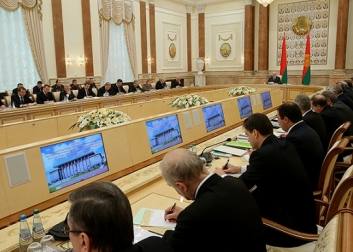President attempts to improve governments work by threatening to dissolve it
 The situation has not changed
The situation has not changed

The Belarusian authorities have no plans to readjust economic policies and pursue structural economic reforms before the presidential elections in 2015. In accordance with the existing practices, the president will attempt to use administrative means (including threats to dissolve the government) to improve the state apparatus’s performance in meeting the projected indicators and eliminating economic imbalances.
Last week, the Government and the National Bank debriefed President Lukashenko about economic performance in 2014 and forecast for 2015.
At the meeting, the president, criticised the government and raised the issue of reshuffle. The President underscored that he was unhappy with the Council of Ministers: “Am I supposed to say, ’Well done, do it?’ Given that this year has been a failure, where are the guarantees that the next one will be a success? I already have no confidence in what you say. In general, I mistrust the government”.
Lukashenko has repeatedly expressed his dissatisfaction with the government headed by Myasnikovich and promised to consider his resignation. Yet there were no major reshuffles, except some staff rotations in some ministries and government bodies. For example, in early October, the new Finance Minister was appointed (Vladimir Amarin), and the new head of the Minsk Executive Committee (Shorets). It is clear that the president is not interested in the government’s resignation before the presidential campaign starts. Such a move would have negatively affected the economic expectations of the population, including destabilising the shaky currency market situation.
The president is more concerned about fundraising to support the economy in 2015, than about the personnel issues. At the meeting he said it was important to maintain the current import substitution policy and protect domestic producers, “If we can produce machine-tool in Belarus, [enterprises] should be equipped with Belarusian machine-tools. References to that we liabilities in the Customs Union, the Eurasian Union and so on shall not be accepted. Own producers should be protected”.
Simultaneously, the Belarusian authorities are stepping up efforts to attract foreign investors, promising not only optimal conditions for investment, but also structural economic reforms. This, in particular, Economy Minister Nikolai Snapkou said at the second “October Economic Forum” in Minsk with the participation of managing director and chief economist of the Moody’s Investors Service Lucio Vinhas de Souza.
In addition, at the Belarusian Investment Forum in London Nikolai Snapkou announced a pilot privatisation project with the participation of the World Bank, and the Deputy Finance Minister Ermolovich announced the new issue of Eurobonds by Belarus worth circa USD 1 billion (with 10-year maturity period).
Also, the Belarusian authorities want the West to lift sanctions against some public officials. In London, the First Deputy Foreign Minister Alexander Mihnevich downplayed the negative effects from the EU sanctions policy on the investment climate in the country, “I would like to debunk a myth about Belarus under sanctions for the investors. There are no sanctions! There is a group of people – about 200 individuals, who are restricted from entering the European Union. Come to Minsk and meet them there, meet them in the UAE or other countries. But not in Europe. Well, that’s the way it is. Nothing is scary about that”.
Meanwhile, talks about structural economic reforms will remain empty at least until the presidential elections in Belarus. The authorities will try to meet the projected performance indicators by using traditional means, such as strengthening discipline of the executives. For instance, as of 2015, the new regulation will take effect, which outlines the rights and responsibilities of the executives (in private and state enterprises).
Before the presidential campaign in 2015, some personnel rotations in the public service are quite possible, however, the Government headed by PM Myasnikovich will not be dissolved.
Subscribe to our newsletter




Situation in Belarus
Constitutional referendum: main consequences


 Video
Video
How to count the political prisoners: are the new criteria needed?


 Video
Video
Paternalism In Decline, Belarusian Euroscepticism, And The Influence Of Russia


 Video
Video












